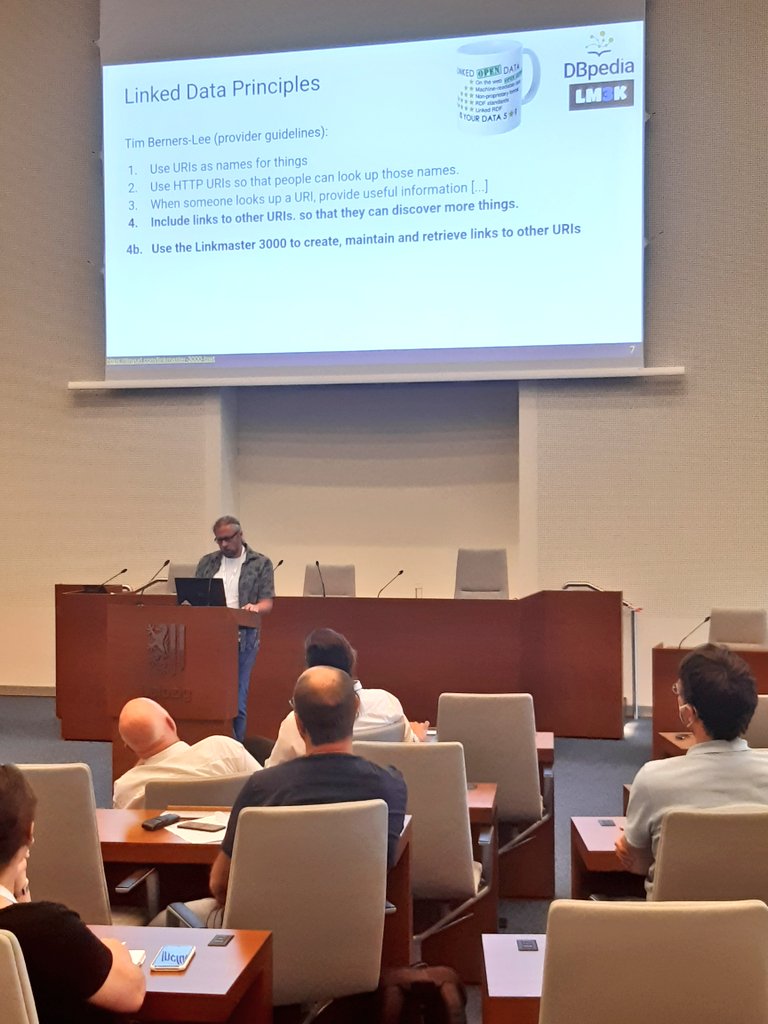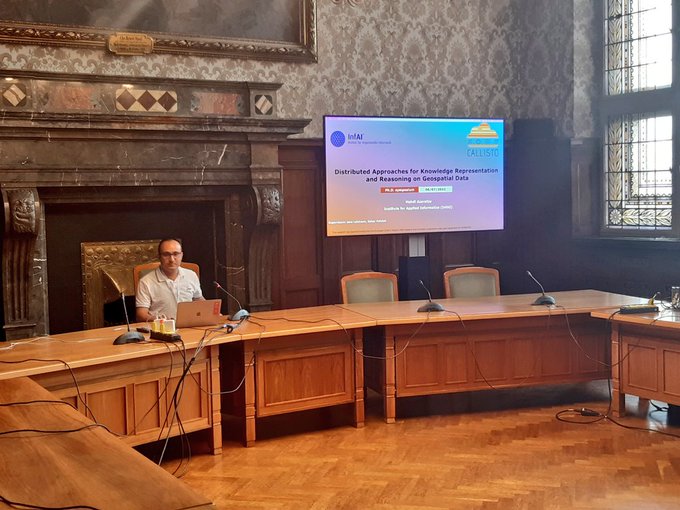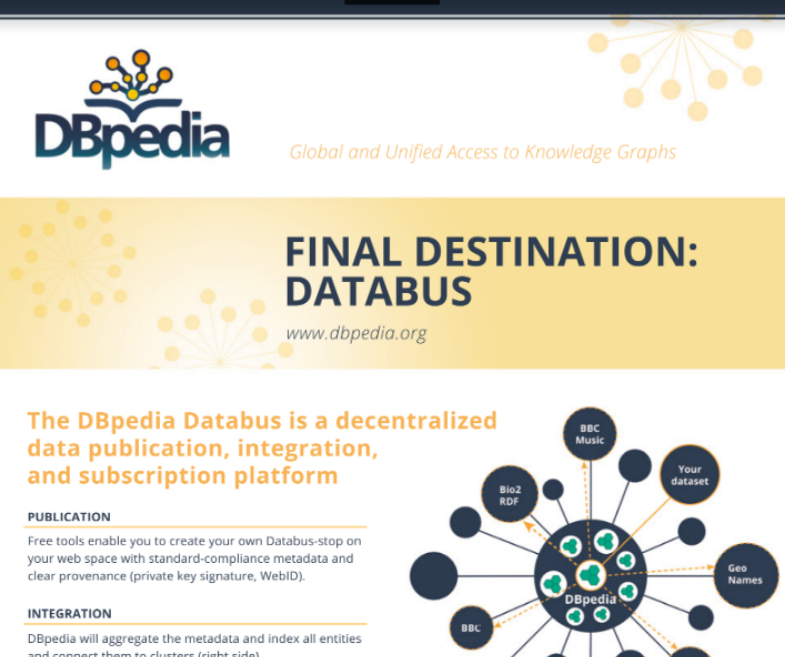The post Wrap up Data Week Leipzig 2022 appeared first on DBpedia Association.
]]>Following, we will give you a brief retrospective about DBpedia @ the LSWT 2022 as well as the first DBpedia Knowledge Engineering PhD Symposium.
DBpedia @ the LSWT 2022

On Tuesday, 5th July, the Leipzig Semantic Web Day (LSWT) took place as part of the Data Week Leipzig. It was an opportunity for scientists, enterprises, and organizations to discuss topics in the field of Semantic Technology. These emphases are demonstrated in presentations by experts from industry and science.
As a part of the LSWT and the session “Data Acquisition and Data Sovereignty“ Sebastian Hellmann (AKSW, InfAI/DBpedia) presented „Linkmaster 3000. If it’s not linked, does it even exist?“.
Later that day, Denis Streitmatter (AKSW, InfAI/DBpedia) gave his talk „Why we need Archivo“ as part of the session “Collaboration and Ontologies”.
1st DBpedia PhD Symposium
Wednesday, July 6th, was all about scientific exchange where junior and senior researchers establish relations and collaborations and exchange ideas. The goal of the event manifests a scientific community as a driver for DBpedia and Linked Data and expects synergies effects that will greatly improve scientific output by the involved community members.
To start the day, Sören Auer (TIB) opened the first PhD Symposium with words of welcome and by giving insights into his experience on “what makes a good PhD”.
The first session started with presentations by Aleksandr Perevalov on “Multilingual Accessibility of Knowledge Graph Question Answering Systems” and Johannes Frey on “Towards FAIR Linked Data Integration”.
After a short coffee break, session 2 started with Marvin Hofer speaking about “Multilingual Accessibility of Knowledge Graph Question Answering Systems”. This was followed by the contribution of Fidan Limani “Bringing Research Artifacts (as closer) Together: Knowledge Graphs for Libraries”.
Afternoon Session
The last Session of the day was started by Gollam Rabby and his topic “Machine Learning on Semantic Scientific Knowledge” followed by Mehdi Azarafza and his presentation about “Distributed Approaches for Knowledge Representation and Reasoning on Geospatial Data”. Afterwards Mirza Mohtashim Alam was speaking about “Representation and Reinforcement Learning on Knowledge Graphs” and Paulo Ricardo Viviurka do Carmo closed the last session with his presentation on “Unsupervised Information Extraction from Academic Data Sources to Knowledge Graphs”.

While the students held their presentations, they received feedback and on the other hand, the symposium participants gained insight 1) on how they structure and define their PhDs, 2) on what the current trends are and 3) on potential connecting a dedicated poster session where all PhD participants could bring their poster and discussed with the audience during the coffee breaks.
Closing
As the first DBpedia PhD Symposium came to an end, Sebastian Hellmann (AKSW, InfAI/DBpedia) and Milan Dojchinovski (DBpedia & CTU Prague) closed the meeting. Afterwards all participants were gathered for a city walking tour followed by the Living Lab Tour.
In case you missed the event, our presentations are available on the DBpeda event page. Further insights, feedback and photos about the event are available on Twitter (#DBpediaPhDSymposium hashtag).
Stay safe and check Twitter or LinkedIn. Furthermore, you can subscribe to our Newsletter for the latest news and information around DBpedia.
Julia & Emma
on behalf of the DBpedia Association
The post Wrap up Data Week Leipzig 2022 appeared first on DBpedia Association.
]]>The post Artificial Intelligence (AI) and DBpedia appeared first on DBpedia Association.
]]>In this digital transformation era, success will be based on using analytics to discover the insights locked in the massive volume of data being generated today. Success with AI and ML depends on having the right infrastructure to process the data.[1]
The Value of Data Governance
One key element to facilitate ML and AI for the digital future of Europe, are ‘decentralized semantic data flows’, as stated by Sören Auer, a founding member of DBpedia and current director at TIB, during a meeting about the digital future in Germany at the Bundestag. He further commented that major AI breakthroughs were indeed facilitated by easily accessible datasets, whereas the Algorithms used were comparatively old.
In conclusion, Auer reasons that the actual value lies in data governance. Infact, in order to guarantee progress in AI, the development of a common and transparent understanding of data is necessary. [2]
DBpedia Databus – Digital Factory Platform
The DBpedia Databus – our digital factory Platform – is one of many drivers that will help to build the much-needed data infrastructure for ML and AI to prosper.  With the DBpedia Databus, we create a hub that facilitates a ‘networked data-economy’ revolving around the publication of data. Upholding the motto, Unified and Global Access to Knowledge, the databus facilitates exchanging, curating and accessing data between multiple stakeholders – always, anywhere. Publishing data on the Databus means connecting and comparing (your) data to the network. Check our current DBpedia releases via http://downloads.dbpedia.org/repo/dev/.
With the DBpedia Databus, we create a hub that facilitates a ‘networked data-economy’ revolving around the publication of data. Upholding the motto, Unified and Global Access to Knowledge, the databus facilitates exchanging, curating and accessing data between multiple stakeholders – always, anywhere. Publishing data on the Databus means connecting and comparing (your) data to the network. Check our current DBpedia releases via http://downloads.dbpedia.org/repo/dev/.
DBpediaDay – & AI for Smart Agriculture
Furthermore, you can learn about the DBpedia Databus during our 13th DBpedia Community meeting, co-located with LDK conference, in Leipzig, May 2019. Additionally, as a special treat for you, we also offer an AI side-event on May 23rd, 2019.
May we present you the thinktank and hackathon – “Artificial Intelligence for Smart Agriculture”. The goal of this event is to develop new ideas and small tools which can demonstrate the use of AI in the agricultural domain or the use of AI for a sustainable bio-economy. In that regard, a special focus will be on the use and the impact of linked data for AI components.
In short, the two-part event, co-located with LSWT & DBpediaDay, comprises workshops, on-site team hacking as well as presentations of results. The activity is supported by the projects DataBio and Bridge2Era as well as CIAOTECH/PNO. All participating teams are invited to join and present their projects. Further Information are available here. Please submit your ideas and projects here.
Finally, the DBpedia Association is looking forward to meeting you in Leipzig, home of our head office. Pay us a visit!
____
Resources:
[1] Zeus Kerravala; The Success of ARTIFICIAL INTELLIGENCE AND MACHINE LEARNING Requires an Architectural Approach to Infrastructure. ZK Research: A Division of Kerravala Consulting © 2018 ZK Research, available via http://bit.ly/2UwTJRo
[2] Sören Auer; Statement at the Bundestag during a meeting in AI, Summary is available via https://www.tib.eu/de/service/aktuelles/detail/tib-direktor-als-experte-zu-kuenstlicher-intelligenz-ki-im-deutschen-bundestag/
The post Artificial Intelligence (AI) and DBpedia appeared first on DBpedia Association.
]]>